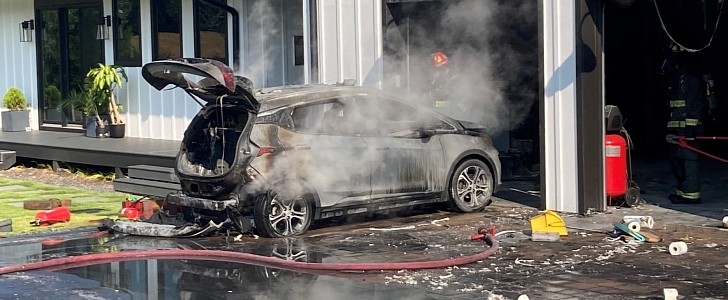The Chevrolet Bolt could’ve been GM’s ticket to EV Nirvana, but instead, it crashed and burnt, literally. Even before the Bolt turned into a disaster, GM laid out plans for a different EV future, which means the Bolt is now a dead end. Although Chevrolet does not admit it, the Bolt has no place in the future for a lot of reasons.
Burning Bolts are a thing of the past, but so is the Bolt itself, it seems. Production at the Orion plant stopped several months ago and even if it will ever restart there’s little chance the Chevy EV will have life left in it. To make matters worse, GM announced a big EV push to fight Tesla and Ford, and the Orion Township plant is a big part of this plan. If you were not aware, this is the same factory commissioned to manufacture the Chevy Bolt. Only this time, the plant has no place left for the Bolt.
The $7 billion plan to overhaul GM’s EV operations includes converting the Orion plant to produce Ultium platform vehicles like the Chevy Silverado EV and its upcoming sibling the GMC Sierra EV. As you’d expect, these new EVs are in high demand, while the Bolt is already dead in the water, with a bad reputation that at the moment seems impossible to overcome. No wonder GM never mentions the fledgling Bolt in their announcements.
Of course, GM could relocate the production to another plant, but this is an expensive undertaking, so why bother? The Chevy Bolt, although a pioneer in its heyday, is now a pariah that is forbidden to enter even ground-level parking lots, for fear it might ignite neighboring vehicles. No one in their sane mind would buy a Bolt now even if production will resume. The model is compromised as a nameplate already and the best thing GM can do is let it fade in history.
The Chevrolet Bolt was launched in 2016, with a minor redesign just before production was halted. In the EV realm, four years is an eternity and the Bolt would stand no chance to compete today in a market that has moved on. For instance, although the Bolt’s battery would afford it to drive 259 miles (416 km) on a full charge, it would be crippled by the long recharge times.
While the model needs more than an hour and a half to go from 10% to 85% SOC, the segment’s bestseller, the Volkswagen ID.4, achieves the same in a little more than 40 minutes. And this comes on top of not having the bad reputation of burning down garages. To have a chance to compete, the Bolt would need a complete overhaul, e.g. adopting the new Ultium tech. But then it would be a brand new vehicle and nobody loves the Bolt nameplate enough to want to stick to it.
The $7 billion plan to overhaul GM’s EV operations includes converting the Orion plant to produce Ultium platform vehicles like the Chevy Silverado EV and its upcoming sibling the GMC Sierra EV. As you’d expect, these new EVs are in high demand, while the Bolt is already dead in the water, with a bad reputation that at the moment seems impossible to overcome. No wonder GM never mentions the fledgling Bolt in their announcements.
Of course, GM could relocate the production to another plant, but this is an expensive undertaking, so why bother? The Chevy Bolt, although a pioneer in its heyday, is now a pariah that is forbidden to enter even ground-level parking lots, for fear it might ignite neighboring vehicles. No one in their sane mind would buy a Bolt now even if production will resume. The model is compromised as a nameplate already and the best thing GM can do is let it fade in history.
The Chevrolet Bolt was launched in 2016, with a minor redesign just before production was halted. In the EV realm, four years is an eternity and the Bolt would stand no chance to compete today in a market that has moved on. For instance, although the Bolt’s battery would afford it to drive 259 miles (416 km) on a full charge, it would be crippled by the long recharge times.
While the model needs more than an hour and a half to go from 10% to 85% SOC, the segment’s bestseller, the Volkswagen ID.4, achieves the same in a little more than 40 minutes. And this comes on top of not having the bad reputation of burning down garages. To have a chance to compete, the Bolt would need a complete overhaul, e.g. adopting the new Ultium tech. But then it would be a brand new vehicle and nobody loves the Bolt nameplate enough to want to stick to it.








